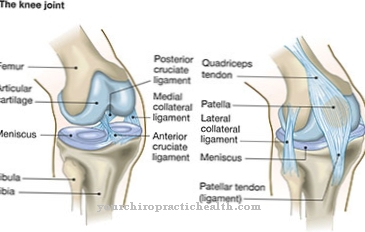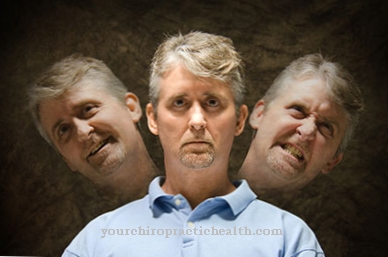Smith-Magenis Syndrome is the name for a rarely occurring hereditary disease. It is caused by a loss of chromosome 17.
What is Smith-Magenis Syndrome?

© vchalup– stock.adobe.com
At the Smith-Magenis Syndrome (SMS) is a rare genetic disease. The affected person lacks a tiny piece of chromosome 17. However, this small section is important because it contains information that is important for the healthy maturation of the child in the mother's womb.
The two genetics specialists Ann Smith and Ellen Magenis are the namesake of Smith-Magenis Syndrome. The doctors first described the disease at the beginning of the 1980s. According to American studies, the prevalence of Smith-Magenis syndrome is 1 in 25,000 births. So far, the disease has only appeared sporadically in German-speaking countries. There are no differences between the sexes in the occurrence of the syndrome.
causes
Smith-Magenis syndrome is caused by a lack of a tiny part of chromosome 17, which means that the information there is also missing. In medicine, the lack of this data is referred to as deletion 17p11.2. The p stands for “petit”, which means “small” and indicates the short chromosome arm.
How much of the chromosome piece is missing varies from person to person. For this reason, the intensity of Smith-Magenis syndrome varies. There are several genes in the missing part of the chromosome. However, the symptoms of Smith-Magenis syndrome are primarily caused by the lack of the RAI1 gene.
Some medical professionals suggest that the lack of the other genes contributes to the individual differences in disease characteristics. Scientific studies are still being carried out on the exact relationships. According to current scientific knowledge, there are no risk factors such as environmental influences or misconduct by the mother during pregnancy.
This is how Smith-Magenis syndrome develops spontaneously. The mutation on the 17th chromosome is caused by chance and starts before fertilization. Mutation is possible in both the mother and the father. However, it may well happen that the children of affected parents remain healthy despite the deletion on chromosome 17 and do not automatically become ill.
Symptoms, ailments & signs
Smith-Magenis syndrome is accompanied by a number of typical behavioral problems. These include developmental abnormalities such as moderate to severe mental developmental disorders. These are mostly delays in language development and general developmental retardation.
Since Smith-Magenis syndrome is a dysmorphic syndrome, there are also dysmorphological abnormalities such as brachycephaly (short-headedness), midface hypoplasia, broad and short hands, deep-set eyes, arched upper lips, corners of the mouth pointing in the lower direction, low-set ears and wide ones Root of the nose.
Furthermore, there are behavioral problems that cannot always be sufficiently recognized in small children. Those affected suffer self-injuries by banging their heads on the wall, biting their fingers or hands, and pulling out toenails or fingernails.
The pain is felt to be reduced. Because the day-night rhythm is also disturbed, the patients suffer from pronounced sleep disorders. In addition, there are health problems such as sensorineural or conductive hearing loss, short stature or scoliosis.
Furthermore, there are changes in the eyes such as myopia, strabismus or a cornea that is too small, a heart defect, epilepsy, brain abnormalities such as ventriculomegaly or urinary bladder complaints.
Typical are also a deep and rough voice, tiredness during the day, low thyroid hormone levels and a lowered immunoglobulin level. Furthermore, many sufferers behave like autistic people, are unable to speak, pursue a uniform, routine everyday life and are afraid of being touched. It is not uncommon for aggressive behavior to even outbursts of anger.
Diagnosis & course of disease
Since the symptoms of Smith-Magenis syndrome are extremely extensive, they are not sufficient for an exact diagnosis of the disease. There are some diseases that resemble Smith-Magenis syndrome. These include the Prader-Willi syndrome. Counting and looking at the chromosomes is also considered insufficient for a reliable diagnosis.
Because of this, the doctor does a genetic test. This method is called the FISH test (fluorescence in situ hybridization). In this procedure, some blood is drawn from the patient in order to examine the blood cells for the absence of certain components of chromosome 17.
The diagnosis of Smith-Magenis syndrome is considered difficult. It is assumed that this circumstance contributes to the low number of cases. It is not uncommon for many affected children to receive a different diagnosis even though they are suffering from SMS. These are mostly ADHD (attention deficit / hyperactivity disorder) or autism.
Smith-Magenis syndrome is considered incurable. The course of the disease depends on its extent, the age of diagnosis and suitable therapeutic measures. Some patients can live to be more than 80 years old.
Complications
Due to Smith-Magenis syndrome, patients suffer from various mental and physical ailments and limitations. In many cases, relatives or parents are also affected by this syndrome and need psychological support and treatment. Those affected suffer from severe developmental disorders and behavioral problems.
They therefore need special support and usually also help in their everyday life. The urge to self-harm can also be felt due to illness, so that treatment in a closed clinic may be necessary. Furthermore, there are sleep problems or hearing loss. The short stature can lead to bullying or teasing, especially among young people.
Those affected also suffer from visual disturbances and a heart defect. In severe cases, epileptic seizures can also occur, which can lead to death. Because of the severe symptoms, life expectancy is usually significantly limited. Treatment of the syndrome is purely symptomatic. Unfortunately, it is not possible to completely limit all complaints. Unfortunately, Smith-Magenis syndrome cannot be prevented either.
When should you go to the doctor?
Treatment by a doctor is always necessary for Smith-Magenis syndrome. Since this is a hereditary disease, it cannot be completely cured, so that those affected usually need lifelong therapy to alleviate the symptoms. If the person concerned wishes to have children, genetic counseling can also be carried out in order to prevent the Smith-Magenis syndrome from being passed on to the descendants.
A doctor should be consulted with this syndrome if the person concerned suffers from severe developmental disorders or shows severe behavioral problems. Those affected are very restless and cannot concentrate. In many cases, self-harming behavior is also indicative of Smith-Magenis syndrome and should always be evaluated by a doctor. Furthermore, the patients often show eye complaints or heart defects. A doctor should also be consulted with these complaints.
Smith-Magenis syndrome can be diagnosed by a general practitioner. Further treatment is then carried out by the respective specialist and depends largely on the severity of the symptoms.
Treatment & Therapy
Because Smith-Magenis syndrome is caused by genetic factors, it cannot be cured. For this reason, treating the condition is limited to symptoms. Speech therapy, occupational therapy and physiotherapeutic measures are considered helpful.
Communication training that includes sign language is also considered useful. Despite all therapy measures, most patients need help throughout their lives. Certain drugs can also be used to treat the symptoms of Smith-Magenis syndrome.
This can alleviate some complaints. The administration of the hormone melatonin improves sleep disorders. Other drugs such as Risperidal can be used to counteract self-harm.
prevention
Smith-Magenis syndrome is a genetic disease. Prevention is therefore not possible.
You can do that yourself
The symptoms of the hereditary disease show up immediately after birth. Naturally, infants cannot initiate adequate self-help measures.In addition, the health impairments are so varied that it is not possible for the sick to improve the situation to a sufficient extent.
Relatives are therefore obliged to design the structure of everyday life and care for the patient in the best possible way for the patient. As self-destructive acts occur, the person concerned must be protected from himself. Otherwise, there may be serious complications and deterioration in health. Since relatives are often overwhelmed with the care of the patient, good care should be taken if necessary. At the same time, a stable social environment is important so that the patient is not exposed to any additional stress.
A large number of the sick suffer from a disturbed sleep and wake rhythm. This represents a special challenge for everyone involved. The abnormal behavior is also not always easy to handle in everyday life. As soon as loved ones reach their emotional and physical limits, they should make changes. The organization of leisure time or the use of psychotherapeutic support can help to experience a corresponding balance. Dealing with the illness is often so stressful that otherwise psychological complications can occur.
Aftercare
Follow-up care for Smith-Magenis syndrome (SMS) is basically aimed at treating the symptoms of the disease. Because SMS is genetic. A cure is not possible. The scope of aftercare treatments and examinations can be very complex with SMS.
The spectrum of possible symptoms ranges from physical abnormalities and developmental delays (both physical and mental) to severe behavioral disorders, intellectual disabilities and serious diseases of the internal organs. The symptoms caused by SMS generally do not heal. The task of follow-up care is to achieve and maintain the highest possible quality of life for people with SMS.
The focus of the aftercare treatments is therefore on continuing the therapeutic intervention. As a result of the follow-up care, children and young adults suffering from SMS must have learned in particular to live with the symptoms of the disease as best as possible. In addition to lifelong drug treatment, doctors also prescribe cures and speech therapy, occupational therapy and music therapy treatments as follow-up treatments (regularly repeated).
As a self-help measure, relatives can create a stable social environment during aftercare for the person suffering from SMS and optimally structure everyday life in the interests of the sick person. If your symptoms worsen, you may need follow-up examinations with specialist doctors.

.jpg)
.jpg)


.jpg)






.jpg)



.jpg)










.jpg)
